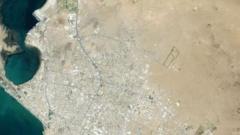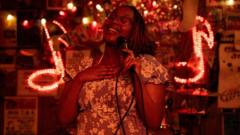In the wake of Syria's nearly 14-year civil war, musicians are eager to navigate their future under the leadership of Hayat Tahrir al-Sham (HTS), a group with a controversial history. Despite the fears of a regressive cultural landscape, artists express a desire for open dialogue and innovative expression, while contemplating the balance between artistic freedom and potential restrictions imposed by the new regime.
Syria's Musicians Face Uncertain Future Under Islamist Leadership

Syria's Musicians Face Uncertain Future Under Islamist Leadership
As Syria's electronic music scene rises, musicians brace for a new chapter under HTS rule.
In the aftermath of Syria’s protracted civil war, the nation’s vibrant music scene flourished amid the chaos, particularly the electronic and heavy metal genres. Syrian musicians are now concerned about how their creative expressions will fare under the newly empowered Islamist leadership of Hayat Tahrir al-Sham (HTS). These artists, many of whom previously faced severe censorship under the Assad regime, cautiously approach this new chapter, eager to foster a relationship with HTS while advocating for artistic liberty.
DJ Maher Green reflects on the necessity of adapting their strategies: “We have to be organized before we talk to them, because they are so organized.” His sentiment resonates throughout the artistic community as they mobilize similar to their past interactions with state security, which previously misunderstood the cultural significance of youth gatherings centered around music and dance.
With the onset of the civil war, traditional scrutiny towards subcultures shifted, leading to a burgeoning heavy metal scene fostered by intense new creativity born from conflict. However, the war also prompted many artists to leave Syria in search of stability, with cautions echoing from those who remained, like musician Wajd Khair. Having temporarily stepped back from music upon witnessing the outbreak of violence, Khair now feels compelled to reclaim his voice, stating, “We have to be more bold... it’s not just Islamic Front and Islamic State here."
Despite some moments of optimism following HTS's rise to power – such as the restoration plans for cultural venues like the Opera House – the landscape remains fraught with uncertainty. Officials initially rumored that the Opera House would close, prompting concern from artists like Khair about the regime’s commitment to cultural expression. Reactions to HTS's early stances have oscillated, as reported changes in public broadcasting reflect the balance they are attempting to strike with the citizenry.
As insurgent forces confront both economic reconstruction and governance, musicians are keen to establish their presence in the cultural dialogue. Green warns, "It doesn’t seem like HTS is willing to look for the cultural side right now," but he remains resilient in pushing for a unified stance within the artistic community.
Ultimately, Syria's musicians find themselves at a crossroads, determined to maintain their cultural identity and continue to innovate amidst shifting political landscapes. Their journey reflects a broader struggle for creative freedom in a region still haunted by authoritarianism, yet filled with hope for a future where diverse artistic expressions can persevere and thrive.
DJ Maher Green reflects on the necessity of adapting their strategies: “We have to be organized before we talk to them, because they are so organized.” His sentiment resonates throughout the artistic community as they mobilize similar to their past interactions with state security, which previously misunderstood the cultural significance of youth gatherings centered around music and dance.
With the onset of the civil war, traditional scrutiny towards subcultures shifted, leading to a burgeoning heavy metal scene fostered by intense new creativity born from conflict. However, the war also prompted many artists to leave Syria in search of stability, with cautions echoing from those who remained, like musician Wajd Khair. Having temporarily stepped back from music upon witnessing the outbreak of violence, Khair now feels compelled to reclaim his voice, stating, “We have to be more bold... it’s not just Islamic Front and Islamic State here."
Despite some moments of optimism following HTS's rise to power – such as the restoration plans for cultural venues like the Opera House – the landscape remains fraught with uncertainty. Officials initially rumored that the Opera House would close, prompting concern from artists like Khair about the regime’s commitment to cultural expression. Reactions to HTS's early stances have oscillated, as reported changes in public broadcasting reflect the balance they are attempting to strike with the citizenry.
As insurgent forces confront both economic reconstruction and governance, musicians are keen to establish their presence in the cultural dialogue. Green warns, "It doesn’t seem like HTS is willing to look for the cultural side right now," but he remains resilient in pushing for a unified stance within the artistic community.
Ultimately, Syria's musicians find themselves at a crossroads, determined to maintain their cultural identity and continue to innovate amidst shifting political landscapes. Their journey reflects a broader struggle for creative freedom in a region still haunted by authoritarianism, yet filled with hope for a future where diverse artistic expressions can persevere and thrive.



















